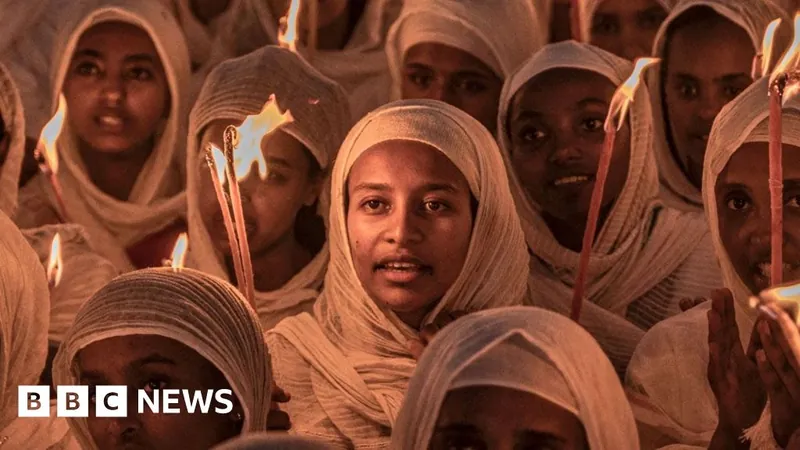
Band Aid at 40: The Christmas Controversy Revisited
2024-11-24
Author: Jacob
Introduction
As the iconic charity single "Do They Know It’s Christmas?" approaches its 40th anniversary, the debate over its message and impact continues to spark discussions across the world. Originally released in 1984 in response to the devastating famine in Ethiopia, the song united some of the biggest names in British and Irish music, spearheaded by Bob Geldof and Midge Ure. With a catchy tune, the aim was to raise awareness and funds for the crisis, resulting in what became a significant milestone in celebrity-driven philanthropy.
Criticism of the Song's Message
However, as we look back four decades later, the lyrics and implications of the song are viewed through a critical lens that questions the representation of Africa. Critics argue that the portrayal of Ethiopia as a land where "nothing ever grows; no rain nor rivers flow" perpetuates harmful stereotypes that oversimplify the continent's diversity and resilience. Dawit Giorgis, a former Ethiopian official, voiced his displeasure stating, “Ethiopia was a Christian country before England… we knew Christmas before your ancestors.” His statement emphasizes a bitter irony: the song assumes a lack of awareness about Christmas among Ethiopians, ignoring the rich cultural and religious heritage of the country.
Philanthropic Impact
Despite these criticisms, Dawit acknowledges that the media campaign spurred a significant philanthropic response that saved lives during a desperate time. Band Aid’s impact as a fundraising initiative cannot be understated—according to Joe Cannon, CFO of the Band Aid Trust, the charity has raised over $3.8 million in the last seven months, aiding approximately 350,000 individuals in various countries including Ethiopia, Sudan, and Chad.
The Reunion and Backlash
The reunion of major artists to rework the single, although adorned with noble intentions, has met with backlash. Ed Sheeran has expressed regret over his recording, realizing that his contribution perpetuates a narrative that doesn't reflect the true story of Africa today. He stated that while he appreciates the fundraising efforts, the message the song sends is outdated and often mischaracterizes the vibrant culture and peace found on the continent.
Voices of African Artists
Fuse ODG, a British-Ghanaian artist, has also criticized the portrayal of Africa in charitable initiatives like Band Aid, emphasizing the progress and joy present in many African nations. He lamented that the charity songs often highlight tragedy while ignoring the continent's existence beyond crisis.
Evolving Charity Approaches
The backlash has triggered broader discussions about how charities should evolve in their approach. As Patrick Gathara, a Kenyan writer, noted, there is a growing effort among humanitarian organizations to humanize their messaging, moving away from depicting people in crisis solely as victims. This shift is echoed in the responses of academics and social commentators alike, who argue that fundraising efforts must center the voices and narratives of the people they aim to assist, rather than casting them as mere objects of pity.
The Role of Self-Representation
In recent years, crowdfunded campaigns have also shown that self-representation is vital in narratives surrounding aid and support. A new direction calls for collaboration with African artists and storytellers to reshape the image of the continent, ensuring the focus is not solely on problems but also on solutions crafted by locals themselves.
Conclusion
As we reflect on Band Aid 40, it becomes evident that the conversation surrounding its legacy is ongoing. Amidst the nostalgia for its massive impact, we must critically assess and adapt the way we tell stories of Africa, ensuring they empower rather than diminish the dignity of those living within its rich and varied cultures. Perhaps it's time to create a new melody—one that celebrates Africa’s strength, resilience, and agency, co-authored by its own voices.









 Brasil (PT)
Brasil (PT)
 Canada (EN)
Canada (EN)
 Chile (ES)
Chile (ES)
 España (ES)
España (ES)
 France (FR)
France (FR)
 Hong Kong (EN)
Hong Kong (EN)
 Italia (IT)
Italia (IT)
 日本 (JA)
日本 (JA)
 Magyarország (HU)
Magyarország (HU)
 Norge (NO)
Norge (NO)
 Polska (PL)
Polska (PL)
 Schweiz (DE)
Schweiz (DE)
 Singapore (EN)
Singapore (EN)
 Sverige (SV)
Sverige (SV)
 Suomi (FI)
Suomi (FI)
 Türkiye (TR)
Türkiye (TR)